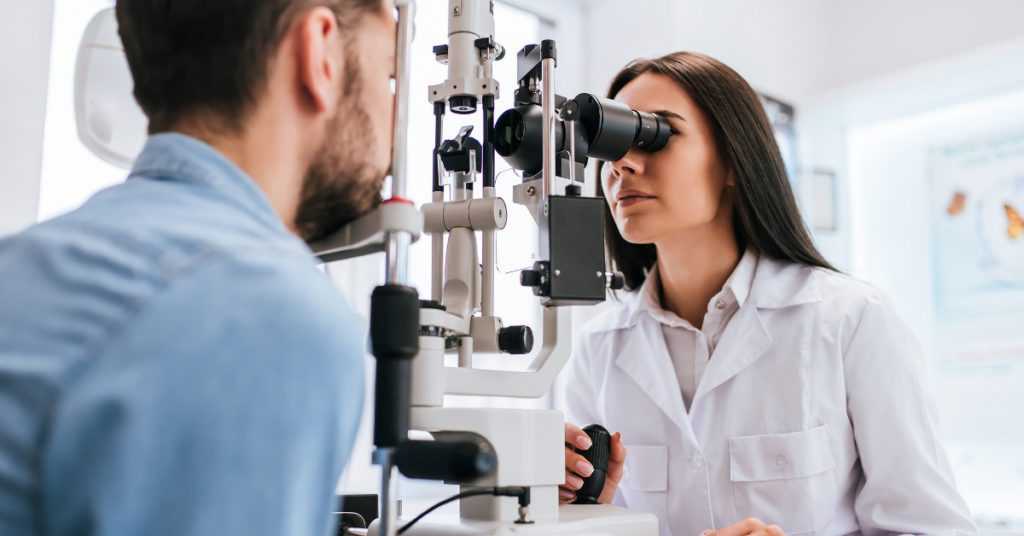Being blind in one eye refers to vision loss in either one of the eyes; this blindness might be temporary or permanent. This sight loss can also be partial, meaning your vision may be blurry or dark. There are many possible reasons for blindness in one eye, and the best treatment will depend on the cause. According to the World Health Organization (WHO), around 2.2 billion people worldwide have a near or far vision impairment, and blindness could have been avoided in nearly half the cases.


Causes of Blindness in One Eye
Vision loss can happen suddenly or slowly over time; a pre-existing disease usually causes the one that happens slowly in the body. If you have temporary or partial vision loss, it usually means that the damage is reversible. You might be able to see again if proper treatment is provided within time. Therefore, you must seek medical help immediately after experiencing any of the following to avoid permanent vision loss:
Reduced Blood Flow
Reduced blood flow is the most common cause of one-eye blindness. The carotid arteries in your neck carry blood from your heart to your eyes and brain. Temporary blindness can result from the narrowing or blocking of blood vessels bringing blood to your eye. Fatty deposits can accumulate on the walls of these blood vessels, limiting the amount of blood that can pass through them. A blood clot could also result in a blockage. A blood clot is a clump of gel-like blood that has coagulated from liquid to semi-solid.
Retinal Migraine
Partial vision loss in one eye with a headache for a short period of time can be caused due to a migraine. This temporary loss of vision lasts for usually up to 30 minutes and can happen either before or after the migraine. Blind spots or flashes of light can also be experienced by people who have migraines on a regular basis.
Retinal vasospasm
This condition, like migraine, can cause temporary vision loss. However, treatment can completely restore your vision. A vasospasm occurs when a blood vessel in your retina constricts. This reduces blood flow, which can result in temporary vision loss in one eye. A variety of conditions can cause vasospasm. A retinal migraine, atherosclerosis, and increased blood pressure are examples of these.
Closed-angle Glaucoma
It occurs when the iris of your eye bulges, preventing fluid from draining properly. This causes the pressure to build up in the eye. You’d experience a lot of pain, nausea, short-term blurred vision, halos, or blindness in one eye. It would be best to go to your doctor; they will look for a slightly enlarged pupil that is not sensitive to light.
Read more about different Eye Infections and their Treatment here.
Treatment for Blindness in One Eye
Sudden blindness (total or near-total vision loss) in one eye should be treated urgently. In most cases, you only have a limited amount of time to get a diagnosis and treatment to avoid permanent blindness. Temporary vision loss may also be a sign of a more severe problem, such as a stroke.


Examination and Evaluation
The evaluation usually includes an eye exam and a neurological examination to check the function of the eyes and brain. Blood tests and brain imaging tests may also be prescribed as part of the initial evaluation. The tests and examinations are performed to look for specific eye problems and generalized medical conditions related to vision loss.
Identifying the underlying medical condition is the first step in treating temporary loss of vision in one eye.
For example, if blood clots cause a blind eye, healthcare providers concerned about a stroke may advise medications for blood thinning or lowering blood pressure. Surgery is usually done in cases where there is an accumulation of plague in the carotid arteries.
Lifestyle Changes
Your physician might also ask you to make modifications to your lifestyle. Making these changes can reverse the damage and prevent you from developing vision loss again. Some of the healthy lifestyle changes recommended by research include:
- stress reduction
- doing physical activities more often
- reducing the use of cigarettes and alcohol
- including more fruits and vegetables in your diet
- avoiding intake of processed or high-fat foods
Find out about the best Eye Hospitals in Lahore here.
Preventing Permanent Vision Loss
Blindness can be avoided if you have your eyes checked on a regular basis. Periodic eye examinations will ensure that you are treated as soon as possible if you have any eye problems or if anything unexpected happens. This can help you avoid losing your vision. When you are diagnosed with a specific type of eye disease, it is critical to follow your eye doctor’s instructions on how to care for your eyes. This may aid in the treatment of your problem. If you suspect you are suffering from blindness or other types of vision loss, schedule an appointment with your ophthalmologist as soon as possible to ensure prompt treatment.
Book an appointment now to answer all your queries. You can book an appointment with the top eye specialists/ophthalmologists in Pakistan through Marham by calling the Marham helpline: 0311-1222398 or by online booking facility through the website or Marham mobile app.
Can’t Find The App?
Android Users:
https://play.google.com/store/apps/details?id=controllers.marham.marhammed&hl=en
Drop a review for us at Playstore if you’ve had a good experience!
iPhone Users:
https://apps.apple.com/pk/app/marham-find-a-doctor/id1095243102
Stay Home. Stay Safe!
FAQs
1. Which foods are beneficial for our eyes?
Some foods that can boost your eye health are carrots, eggs, fish, nuts, green leafy vegetables, and berries.
2. How often should I visit an eye doctor?
It is generally recommended to visit an eye specialist once every year. However, if you have an eye disorder it is better to visit your doctor regularly.
3. How do I know that I have an eye problem?
If you are experiencing constant pain in the eye, a severe headache, have a hazy or blurred vision you should visit your doctor.

